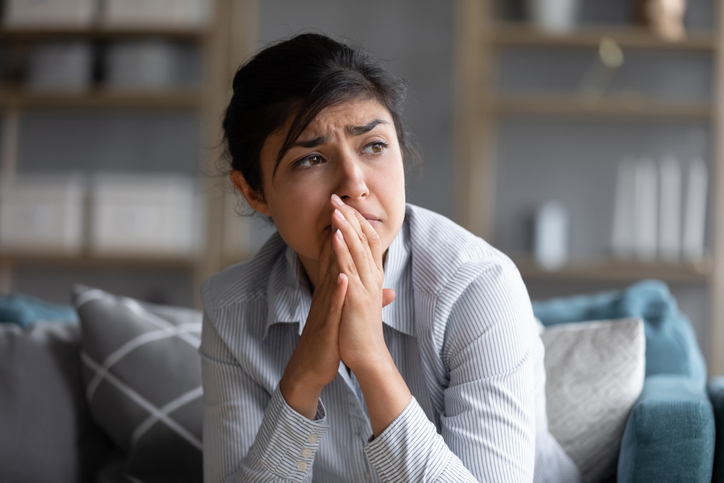Commitment + Clinical Leadership = Better Outcomes

What Causes Anxiety?
It’s common for many people to experience anxiety in their lifetime, with the Anxiety & Depression Association of America estimating that anxiety affects 18.1% of adults over the age of 18 each year.1
However, constant anxiety can interfere with your life and impact your everyday activities, emotions, and behavioral patterns. This can make it harder to accomplish your goals and build relationships when you consistently feel worried and stressed.
People who experience anxiety on a daily basis may have a generalized anxiety disorder. Some signs that you might have generalized anxiety disorder include:2
- Feeling a loss of control over the source of the anxiety
- Unable to participate in daily activities due to anxiety
- The causes of your anxiety are amplified in your head
- Avoiding people, places, and situations that cause anxiety
If you think you might have generalized anxiety disorder or any other form of anxiety, it’s important to understand the warning signs and take the necessary steps to receive a proper diagnosis from a medical professional.
Here are 8 possible causes of anxiety to help you understand why you might frequently experience anxiety.
Persistent Stress
Stress occurs when you are overwhelmed, and the pressure can often make you feel hopeless and unable to deal with your situation. Stress can come from many circumstances, including everyday obligations, the workplace, relationships, finances, politics, the loss of a loved one, and medical illnesses.
Stress can lead to anxiety and cause you to worry about events in your life that you feel are out of your control. This can lead to anxiety, and cause you to feel tired, tense, and irritable.
Genetics
There is growing evidence that anxiety and genetics are related. There have been a series of studies on how genetics play a role in anxiety, with research finding that duplicates of chromosome 15 make people more prone to panic disorders and phobias.3
If someone in your immediate family experiences constant anxiety, then you are more likely to experience anxiety. Talk to a doctor if you believe family history or genetics is the cause of your anxiety.
Personality
There is growing research that some personality types are more likely to experience anxiety than others. The personalities more prone to experiencing anxiety include:4
- Someone who wishes to control their life
- Perfectionists
- People with low self-esteem
- Those who are easily embarrassed
- Introverts
If you experience anxiety frequently, it may be a side effect of the way that you view the world.
Brain Chemistry
Our brains play a role in our mindset, with anxiety being linked to several nerve cells and brain regions that deal with thoughts and emotions. Anxiety can be caused when these brain regions fail to communicate properly with the rest of the body, or if the connections are weak.5
There are some medications that are currently on the market to help rebuild these brain connections and reduce anxiety levels. Speak to a doctor about anxiety medication if you have anxiety caused by a change in brain chemistry.
Past Experiences or Trauma
Anxiety can be caused by past traumatic events and make you feel like you don’t have a sense of control. Many sources of anxiety can come from difficulties such as emotional abuse, losing a loved one, neglect, and bullying.6
Trauma can be especially impactful if it happened at a significant point in your life such as childhood. These feelings can live on with you and contribute to your anxiety. Some ways trauma can impact anxiety are through flashbacks, bad dreams, avoiding places that remind you of trauma, and difficulty sleeping. There are many therapy programs available if you need to work through anxiety caused by trauma.
Alcohol
Some people drink alcohol when they feel anxious because they believe alcohol can help them unwind and calm their nerves, especially in social settings. However, alcohol can worsen the effects of anxiety by changing the number of neurotransmitters and serotonin in the brain. This causes a dependence on alcohol whenever facing social situations, such as needing a drink in the morning or drinking frequently at gatherings.7
It is estimated that 7% of Americans have social anxiety, with many of them drinking in the hopes it will relieve their symptoms. However, 20% of people with social anxiety disorder suffer from alcohol dependence, which can lead to changes in overall mood as the individual becomes more and more dependent on alcohol.8
Other Health Disorders
Sometimes anxiety can be a side effect of another health disorder you may have. Some common disorders associated with anxiety include:2
- Alcohol withdrawal
- Chronic pain
- Diabetes
- Drug misuse/withdrawal
- Heart disease
- Hypertension
- Irritable bowel syndrome
- Medication withdrawal
- Tumors
It is more likely that your anxiety is caused by a medical disorder if nobody in your family has anxiety and if you have never had anxiety before.
Gender
Another cause of anxiety is gender; your gender will determine what types of anxiety you are more likely to experience. Women are more prone to experience generalized anxiety disorder, panic disorder, phobias, post-traumatic stress, and agoraphobia.9
Men and women have been found to be equally prone to social anxiety disorder (SAD) and obsessive-compulsive disorder (OCD). However, more men have been diagnosed with these forms of anxiety.9
Anxiety and Your Life
If you think that you have anxiety that constantly prevents you from building relationships and performing your daily obligations, see a medical professional. It’s important to understand the cause of your anxiety in order to take steps to overcome it.
Saber Healthcare is an organization dedicated to providing consultant services to long term care providers. This article is for informational purposes and is not meant to be seen as professional advice. Please consult with a medical expert before relying on the information provided.
Sources
- https://adaa.org/understanding-anxiety/facts-statistics
- https://www.mayoclinic.org/diseases-conditions/anxiety/symptoms-causes/syc-20350961#:~:text=A%20big%20event%20or%20a,anxiety%20disorders%20than%20others%20are.
- https://www.ncbi.nlm.nih.gov/pmc/articles/PMC3181683/
- https://www.beyondblue.org.au/mental-health/anxiety
- https://www.webmd.com/anxiety-panic/guide/generalized-anxiety-disorder
- https://www.mind.org.uk/information-support/types-of-mental-health-problems/anxiety-and-panic-attacks/causes/
- https://www.healthline.com/health/alcohol-and-anxiety
- https://adaa.org/understanding-anxiety/social-anxiety-disorder/social-anxiety-and-alcohol-abuse
- https://www.healthline.com/health/anxiety-causes
